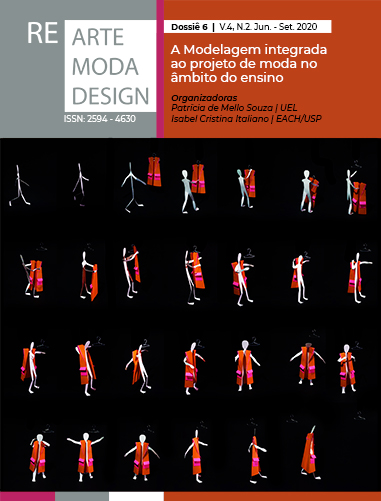Bionics applied to modeling focuesed on sustainability: contribuitions of the modthink model
DOI:
https://doi.org/10.5965/25944630422020243Resumo
The present study displays the result of the application of the methodological phases of the MODThink model by Emídio (2018), in the context of an academic project of the first year of the Fashion Design course at the State University of Londrina. Through the application of the bionic creativity tool, it demonstrates how it was possible to include the concept of the project in product modeling, in addition to contributing to aspects of addressed to sustainability.Downloads
Referências
AMADOR, M. B. M. Sustentabilidade: constatação de uma prática, ainda, abissal em ambiente rural. Palestra proferida no III Fórum Ambiental da Alta Paulista, Tupã-SP, 4 set. 2007.
BAXTER, Mike. Projeto de produto: guia prático para o design de novos produtos. São Paulo: E. Blucher, 2011.
BIRKELAND, J. Design for sustainability: a soucebook of integrated eco-logical solutions. London: Earthscan Publications, 2002.
BRIGGS, John; PEAT, F. david. Sabedoria do caos. 2000. Disponível em: . Acesso em: 29 de maio de 2019.
CÂNDIDO, Luís H. A.; SANTOS, Sandra S.; MARQUES, André C.; VIEGAS, Maurício da S.; KINDLEIN, Wilson Jr.. Desenvolvimento de elementos de junção/fixação a partir de estudo da Biônica. Paraná, PR: 7° Congresso brasileiro de pesquisa e desenvolvimento em design, 2006.
EMÍDIO, Lucimar de Fátima Bilmaia. Modelo MODThink: o pensamento de design aplicado ao ensino-aprendizagem e desenvolvimento de competências cognitivas em modelagem do vestuário. Tese (Doutorado). Universidade Estadual Paulista (UNESP). São Paulo, 2018.
GLEICK, James. CAOS: a criação de uma nova ciência. 17 ed., Rio de Janeiro: Campus, 1989.
PAZMINO, Ana Verônica. Como se cria: 40 métodos para design de produto. São Paulo: Blucher, 2015.
POZO, J. I. (Org). A solução de problemas não aprender a resolver, resolver para aprender. Porto Alegre: Artmed, 1998.
ROMANHA, W. S. Fractais na natureza. 30 jun. 2009. Disponível em: < http://microsintonias.blogspot.com/2009/06/fractais-na-natureza.html>. Acesso em: 29 de maio de 2019.
Downloads
Publicado
Como Citar
Edição
Seção
Licença
- Autores mantém os direitos autorais e concedem à revista o direito de primeira publicação, com o trabalho simultaneamente licenciado sob a Licença Creative Commons Attribution 4.0 Internacional, que permite:
1. Compartilhar — copiar e redistribuir o material em qualquer suporte ou formato para qualquer fim, mesmo que comercial.
2. Adaptar — remixar, transformar, e criar a partir do material para qualquer fim, mesmo que comercial.
O licenciante não pode revogar estes direitos desde que você respeite os termos da licença.De acordo com os termos seguintes:
1. Atribuição — Você deve dar o crédito apropriado, prover um link para a licença e indicar se mudanças foram feitas . Você deve fazê-lo em qualquer circunstância razoável, mas de nenhuma maneira que sugira que o licenciante apoia você ou o seu uso.
2. Sem restrições adicionais — Você não pode aplicar termos jurídicos ou medidas de caráter tecnológico que restrinjam legalmente outros de fazerem algo que a licença permita -
Plágio, em todas as suas formas, constitui um comportamento antiético de publicação e é inaceitável. Esta revista utiliza o software iThenticate de controle de similaridade.






